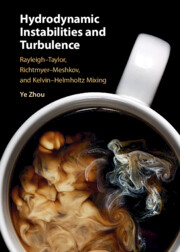 Hydrodynamic Instabilities and Turbulence
Hydrodynamic Instabilities and Turbulence Book contents
- Frontmatter
- Dedication
- Contents
- Preface
- Acknowledgments
- Part 1 Fundamentals
- Part 2 Hydrodynamics of Complex Flows
- Part 3 From the Microscopic to Cosmic Scales
- 18 High-energy-density physics
- 19 Inertial confinement fusion implosion
- 20 Laboratory applications
- 21 Astrophysical and space applications
- 22 Mixmodels
- 23 Numerical simulations of mixing
- 24 Does 2D turbulence resemble 3D turbulence?
- References
- Index
19 - Inertial confinement fusion implosion
from Part 3 - From the Microscopic to Cosmic Scales
- Frontmatter
- Dedication
- Contents
- Preface
- Acknowledgments
- Part 1 Fundamentals
- Part 2 Hydrodynamics of Complex Flows
- Part 3 From the Microscopic to Cosmic Scales
- 18 High-energy-density physics
- 19 Inertial confinement fusion implosion
- 20 Laboratory applications
- 21 Astrophysical and space applications
- 22 Mixmodels
- 23 Numerical simulations of mixing
- 24 Does 2D turbulence resemble 3D turbulence?
- References
- Index
Summary
Inertial Confinement Fusion (ICF) recently became the first technology to achieve ignition of hydrogen nuclear fusion fuel in the laboratory. Unlike magnetically confined fusion plasmas such as tokamaks, ICF requires high fuel compression. This implies a high convergence and high velocity implosion, usually driven with laser beams. This allows hydrodynamic instabilities to develop, primarily RTI and RMI. During the initial shock and acceleration phase when the shell is brought up to the peak implosion velocity, RMI instabilities at the various interfaces are followed by ablation front RT growth as the low-density plasma accelerates the dense shell of solid ablator and fuel. The implosion deceleration at the center is also unstable. The resulting spikes and bubbles prevent efficient fuel compression, and can also inject contaminants. I will discuss the measurement and mitigation of this problem. Z-pinch machines, which instead use an electrical current to compress the plasma, will illustrate the role of MHD in the ICF application.
Keywords
- Type
- Chapter
- Information
- Hydrodynamic Instabilities and TurbulenceRayleigh–Taylor, Richtmyer–Meshkov, and Kelvin–Helmholtz Mixing, pp. 385 - 406Publisher: Cambridge University PressPrint publication year: 2024
